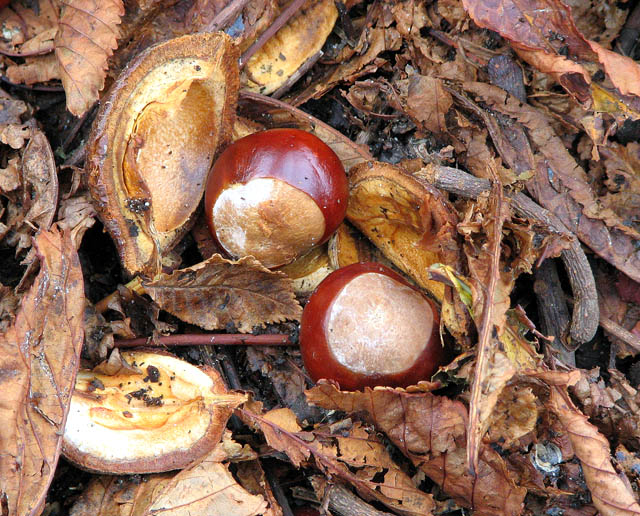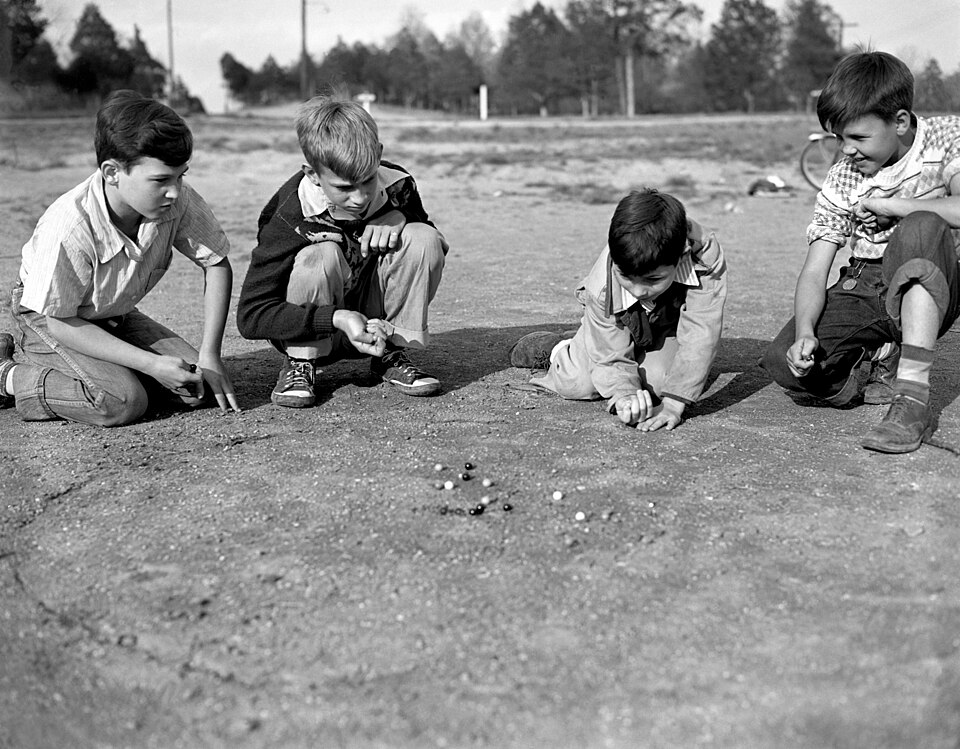NO ONE will be playing conkers in Ireland this autumn.
Maybe no one would anyway. I’m not sure that children still do. Conkers is a clash of strung chestnuts. Each side takes turns at walloping the other’s as it dangles on a string. Do kids not do that any more?
Well, for whatever reason, they invade the park near my home every year to gather up chestnuts in their spiky green shells. If the nuts have not fallen yet, they throw sticks up into the trees to dislodge them.
Maybe they like them for nothing more than the mahogany sheen of their surface when broken out of the shell. Maybe they just compete to get the biggest one. Or maybe they still play conkers. I don’t know.
 Conkers preparing for battle (Pic: Evelyn Simak/WIkimedia)
Conkers preparing for battle (Pic: Evelyn Simak/WIkimedia)They will not be gathering conkers this year because they have all been blown prematurely from the chestnut trees by a storm called Floris.
The paths and greens of our local park are littered with them. They are small. The shells are still tight and hard. They are of no use even to themselves.
Conkers was one of the most predictable seasonal games of an Irish boyhood. The ripening of the chestnuts coincided with the return to school. Boys meeting for the first time in a new class could establish a pecking order between them by competing at conkers, which was better than the alternatives, fighting or dunking smaller boys in the toilets.
Yes, we did that, or rather the bigger boys did that. I was always short for my age so got my hair wet a couple of times, hung upside down over the toilet bowl while the cistern was flushed.
Some of the boys in my year were violent and dressed for combat. The distinctive markers of the fighter then were winkle picker shoes and the scout belt.
The shoes for kicking the groin and the belt because it could be unbuckled in a single movement and swung or wrapped on the fist like a gauntlet.
But most boys had gentler competitive amusements.
The strange thing about these was that they came in seasons that had no relation to the weather.
 Boys playing marbles (public domain)
Boys playing marbles (public domain)One was the catty season. A catty was a little catapult made of coloured elastic bands that were stretched back from the thumb and forefinger. The pellet was usually a rolled up bus ticket, flattened and folded, or any little piece of cardboard.
You might be sitting in class during a Latin lesson and when the teacher turned towards the blackboard you would get shot in the ear by someone behind you and would need not to cry out despite the sting.
Worse still was the peashooter season. These were rarely properly fashioned pea shooters and the ammunition was rarely peas. More often the weapon was improvised from the tube of a ball pen and the payload was barley.
And sometimes when it hit you in the neck it came wrapped with a string of spit.
And there was the marley season. Marlies, or marbles were fascinating in themselves. I would hold them up to the light and try to work out how they had got the twist of colour into the middle of the glass ball. There was a pleasure in having a pocketful of them, of many colours, even if you weren’t good at the game.
Essentially - and I’m sure you know this - two marbles, one from each player, were set in a circle drawn with chalk on the ground and each player would shoot from a distance to knock the other players marble out of the ring. You shot with the thumb flicked out of a half-closed fist.
There were two kinds of marble, the basic marley and the booler. The booler was larger. And often boys who won a booler would resist the challenge to risk it in another game. It was a prize worth keeping.
And yet, strangely the marley season would pass too. Boys knew by some kind of intuition that a season had come to an end and that another was coming and I have no idea how they knew that.
Today we have the internet but there was some kind of medium then through which intelligence flowed. It didn’t just bring the signal that a game’s season had arrived or ended. It also carried jokes and songs and bawdy intimations of deeper knowledge that younger boys would have to pretend to understand.
We were telling jokes when we were ten that I could not tell here in print and I still think some of them are laugh out loud funny.
Some were also racist and sexist and disablist and every other-ist that would disgrace you if you shared them in public or in social media now.
These are the reflections that came back to me walking through a Belfast park after a storm, stepping on unripe chestnuts scattered over the path, reminders of boyhood, and realising that I simply don’t know if those customs have died out or if they are still indulged in some schoolyard I’m never likely to visit.
Malachi O’Doherty’s novel on the Northern Irish Troubles, Terry Brankin Has A Gun, is published by Merrion

